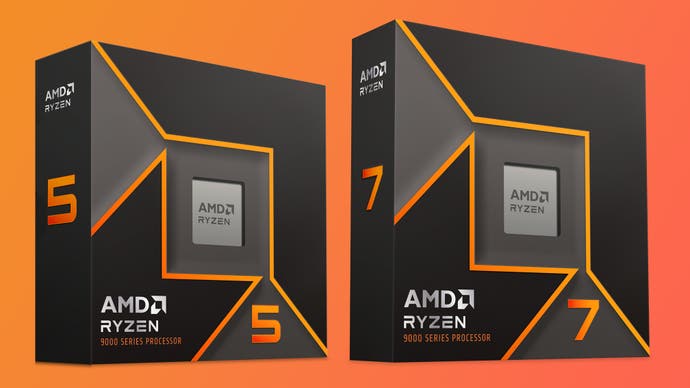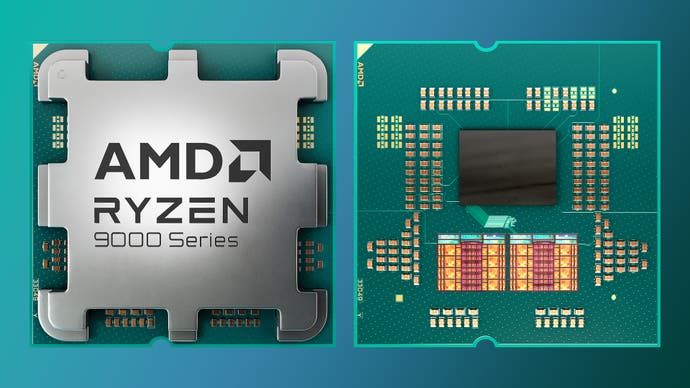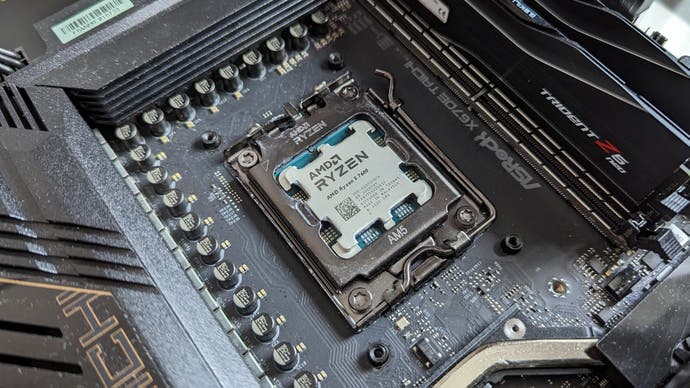AMD Ryzen 5 9600X and Ryzen 7 9700X review: Zen 5 impresses, but 7800X3D still reigns for gaming
A solid generational upgrade, but gamers should wait for the inevitable X3D models.
With our gaming results in view, it's clear to see that the Ryzen 5 9600X and Ryzen 7 9700X are powerful performers that stand up to Intel's headlining 14th-gen processors - though the last-gen Ryzen 7 7800X3D retains a dominant performance advantage in all of our gaming tests.
Still, it's clear that the improvements to single-core speed do make a difference in gaming, with around 10 percent gen-on-gen performance uplifts for both processors in Flight Sim 2020 and nearly 15 percent in Far Cry 6. Other titles, like the more GPU-limited Forza Horizon 5 benchmark, showed slightly lower improvements - around five percent.
Other tests such as Hitman 3 and Crysis 3 Remastered also fell in this range, with Cyberpunk 2077 showing a steep 15 percent uplift for the 9600X but only three percent for the 9700X against their immediate predecessors at 1080p. 1440p and 4K results tended to show smaller margins, but the prevalence of upscalers like DLSS in both modern gaming and our tests meant that these higher resolutions can remain quite CPU-limited in certain games - so CPU choice remains quite important.

What surprised me is the relative lack of movement in content creation. Our transcoding test, for instance, showed basically no improvement for the 9600X over the 7600X, while the 9700X was actually fractionally slower than the 7700X in H264 encoding - though the HEVC test did favour the 9700X.
We did see more easily measurable leaps in Cinebench, with both the R20 and 2024 versions of this 3D modelling benchmark exactly matching AMD's claimed 16 percent average IPC leap with a 16 percent improvement in single-core speeds for the 9600X versus the 9600X. Meanwhile, there was a slightly smaller but still impressive 10 to 13 percent gen-on-gen improvement for the 9700X over the 7700X depending on the version of the benchmark.
It almost goes without saying for AMD processors these days, but the Ryzen 9000 chips also proved extremely efficient, normally topping out at around 62°C at their default 65W TDP. Increasing the TDP limit to 105W with PBO didn't net a measurable performance advantage in most games - we spotted just a one or two fps advantage in Cyberpunk 2077 - but this change did unlock significantly more extra performance for the 9700X in our content creation benchmarks. With the new curve shaper functionality, it ought to be possible to achieve similar results without raising temperatures to the 80s we spotted at 105W.

AMD has cut the recommended retail prices of these new processors, making the £269/$279 Ryzen 5 9600X and £339/$359 Ryzen 7 9700X more attractive on debut than the £319/$299 7600X and £419/$399 7700X - especially in the UK. However, two years' worth of discounts on extant Ryzen 7000 processors make them the better option for price-conscious gamers in the short term. The £186 7600X offers a lot of performance for the money, and the even cheaper, slightly slower 7600 and 7500F can be even more enticing. If you want high-end performance at a more mid-range price, the 7800X3D has dropped to £330/$340 new (or below £300 used) and outperforms everything we tested in this article in (almost) every game.
Intel's recent Core i5 and Core i7 CPUs are also not to be discounted in terms of value and outright performance, though the instability and degradation issues that have affected 13th and 14th-gen units may rule them out from buyers' shortlists. You could always avoid this by opting for a 12th-gen model instead, which are also slightly cheaper, but you do also give up a measure of performance as our 14th-gen testing shows.

It'll be interesting to learn more about the Ryzen 5 9600X and Ryzen 7 9700X as other reviews go live today, and as usual we encourage you to read widely to get a broader understanding of the situation. CPU performance demands range widely from game to game - and even scene to scene within the same title! - so the choices we're forced to make as reviewers in terms of workload selection necessarily lock us into a limited view of the overall landscape. It'll be fascinating to see how this one shakes out, and even more so as two more Ryzen 9000 CPUs land later this month.
For our part, we intend to add a significant number of new game benchmarks in time for those second round of reviews, so stay tuned for this and much more from us on the PC front. Our new benchmarking system means that there's plenty of extra dimensions for CPU benchmarking too - power consumption, RAM speeds, optimised settings and overclocking - and we're excited to explore at least some of these possibilities over the next few months.
